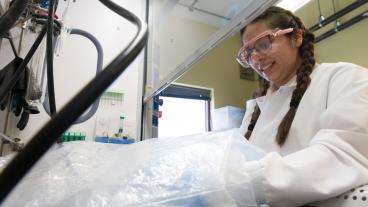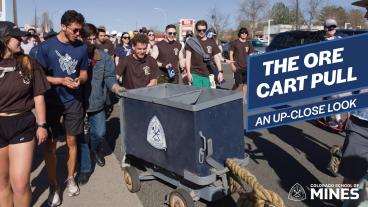The hallway was empty when Professor Roel Snieder approached. “No Class Today” the sign on the door announced. But it wasn’t true. Snieder had not cancelled class. “Steam was coming out of my ears,” said Snieder, co-director of Mines’ Ethics Across Campus (EAC) program.
A few moments later two late-arriving students appeared. “Since no one is here,” one asked, “would you give us some advice on a project we’re doing?” Not wanting to waste the hour, the still seething Snieder agreed and followed them into a classroom. “April Fool!” yelled the laughing students from the not-really-cancelled class. Snieder laughed a little too, but the nervous students quickly got serious. It was clear that honesty isn’t something Snieder is comfortable joking about – even on April 1.
EAC encompasses many ethics-related educational, research and outreach activities. Consistent with Mines’ mission statement and its goals for undergraduate and graduate students, ABET (formerly Accreditation Board for Engineering and Technology) criteria, and National Institutes of Health and National Science Foundation requirements, EAC promotes responsible and ethical conduct. Mines has always stood for integrity, of course, but in an increasingly complex world, ethics reflection and research have expanded and become more formalized.
As Snieder, who holds the Keck Foundation Endowed Chair of Basic Exploration Science, has noted: “Science and engineering in the broadest sense not only help us better understand the world in which we live; these fields also increase the power that we hold over the world. Unfortunately, neither science nor engineering comes with a recipe how to use that power.”
Undergraduate courses under the EAC umbrella include Nature and Human Values, Environmental Ethics, and Engineering and Social Justice, all delivered by the Division of Liberal Arts and International Studies (LAIS). Students in the LAIS basic general ethics course select a winner each year for the Golden Rotary Club “Ethics in Business Award.” And LAIS faculty working with Metallurgical and Materials Engineering Professor Corinne Packard recently secured a new NSF grant to infuse modules on the ethics of nanotechnology into the undergraduate LAIS curriculum.
Graduate courses include The Art of Science and Introduction to Research Ethics, which is team-taught by one faculty member from LAIS and another from applied science and engineering. And since 2010 LAIS faculty member Jason Delborne has taken a small group of Mines graduate students to “Science Outside the Lab,” a policy immersion program in Washington D.C.
LAIS Professor Carl Mitcham, EAC co-director and director of the Hennebach Program in the Humanities, regularly serves as one instructor in the team-taught Research Ethics seminar. As Mitcham explains, pedagogical research has shown that the effectiveness of such a class depends on an interdisciplinary approach and interaction among participants. Working together, faculty and students collaborate to:
- Compare, contrast and evaluate basic ethical theories
- Address a range of real-world ethical issues they may confront in their professional lives
- Articulate their own ethical ideals and commitments to science, society and the environment
Mitcham and Snieder are repeatedly impressed by the depth of thought and conviction that students reveal in the personal ethics statements that cap the seminar. They don’t grade the specific ethical perspective students develop, but rather look for the quality of argumentation and materials the students use to support their positions. The process is inspiring. “Their seriousness encourages me to try to lead a more serious life as well,” said Mitcham.
Mitcham is, indeed, serious about the field of ethics. He has edited a four-volume Encyclopedia of Science, Technology, and Ethics (2005), which will come out in a second edition next year. As an expert for the European Commission’s Directorate-General for Research and Innovation, Mitcham is also the editor of a current report on "Ethical and Regulatory Challenges to Science and Research Policy at the Global Level.” This report’s proposal for the promotion of global standards for responsible research and innovation has been endorsed by the Danish presidency of the European Union, which recently sponsored an international conference on “Science in Dialogue: Toward a European Model for Responsible Research and Innovation.” Mitcham was an invited participant.
As Mitcham and co-author Adam Briggle argue in Ethics and Science, forthcoming from Cambridge University Press, “The kind of world we are creating will not simply be decided by expanding scientific knowledge, but will depend on views about good and bad, right and wrong.”
Personal Code of Professional Ethics
By Dan Worrall, Mines graduate student
Honest Conduct: Never falsify data; never lie; never give a mostly true, easy answer instead of a difficult, fully true answer. Present contradictory evidence if it exists. Finally, never present others’ work as my own.
Keep Quality Records: Keep clear and thorough records. This will help me to produce better quality research, prevent me from making and publishing unknown errors, and make the results generated more useful to others.
Publicize Research: Publish as much data as possible. Share results as well as detailed methodology. Always be willing to help those who ask.
Mentor Others: Make it a professional priority to help develop other engineers, and never hold back skills or discoveries for personal gain.
Practice Discretion: Refrain from arguing points I am not thoroughly knowledgeable of. Never present a statement as fact when I am not fully aware of the supporting data.
Be Aware of Wider Impacts: Always keep in mind the effects of my work on other people and society at large.
Separate Goals and Ethics: Always keep in mind what my personal goals are and how they may cloud my judgment. A decision may advance my career and still be ethical, but care must be taken to keep personal desires out of ethical reasoning.
Evangelize: Try to let my behavior be a good example of ethical professionalism, and try to promote openness and collaboration in research.
Blow the Whistle: If a superior is acting in an unethical manner, it is my responsibility to confront and/or report him or her.
10 Ethics Questions for the Scientist or Engineer
By Roel Snieder, Mines professor
What do I value?
What do I want to grow?
Who, or what, do I serve with my work?
What is the noble purpose of my work?
What types of errors are ethically acceptable?
Why is trust so essential in science?
Why does plagiarism constitute an ethical problem?
Why file for a patent?
Who should be among the authors of a paper?
Who should be first author?



